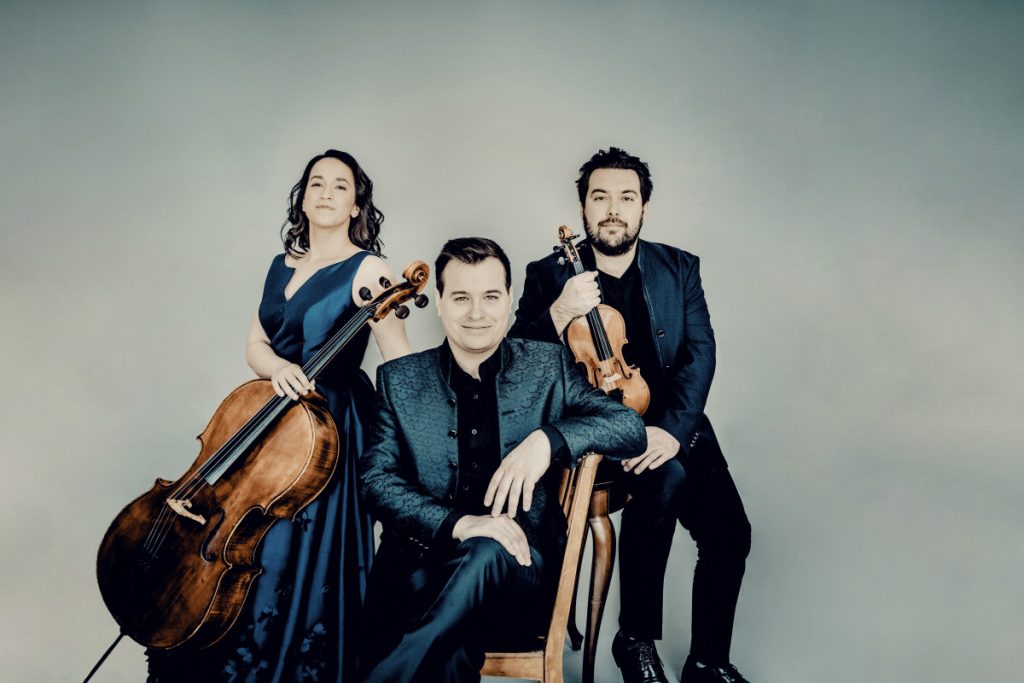
Gabriel Weber
Staff Writer
An international force, chamber ensemble Trio Bohémo performs at 4 p.m. today in Elizabeth S. Lenna Hall with a program featuring not only their instruments — but also their voices.
Violinist Matouš Pěruška, cellist Kristina Vocetková and pianist Jan Vojtek formed their trio in 2019. A very energetic and passionate team, Vocetková said, they function as a family; group chemistry is really the engine of their music making.
“None of us dreamed about life as a chamber musician, especially as a piano trio. In fact, for all of us, it was the least favorite discipline of chamber music, but then we met, and we felt the chemistry and the immediate connection in music, that understanding without words,” Vocetková said. “It’s something magical. From that moment when we experienced it for the first time, it was quite natural. Without any discussions, we dropped all of our other activities and concentrated on the trio full time — we are completely devoted.”
Trio Bohémo is performing Antonín Rejcha’s Piano Trio No. 6 in A Major, Op. 101; Johannes Brahms’ Piano Trio No. 1 in B Major, Op. 8; and Jan Vičar’s cycle of folk songs “From Moravia.” Rejcha and Vičar are Czech, an homage to where the musicians of Trio Bohémo hail, and Brahms is from Germany, a geographical neighbor.
The two Czech pieces are summery, cheerful and bubbly, while Brahms’ work is incredibly deep, Vocetková said.
“It’s basically a love letter,” Vocetková said about Piano Trio No. 1. “It’s a story about his unfulfilled love for Clara Schumann; it starts on a positive note, but most of the people know how it turned out, and it wasn’t a happy ending. It becomes very dramatic, very rich and deep in emotion.”
The work was written months after Brahms met Schumann when he was 21 years old, though he later made considerable alterations at 56 years old. Brahms typically destroyed works he didn’t consider to be worthy but did not withdraw the original version of his Piano Trio No. 1 and took a somewhat blasé tone to what was done with it.
“With regard to the refurbished trio, I want to add expressly that while it’s true that the old version is bad, I do not claim that the new version is good! What you do now with the old one, whether you melt it down or print it anew, is quite seriously all the same to me,” Brahms said in a letter to his publisher Fritz Simrock.
While Brahms imbued his emotional turmoil into his work, all three pieces are challenging in their own way.
“I think the most challenging, surprisingly, is the Trio by Antonín Rejcha as he was a flute player; the writing for our three instruments seems really easy, but it’s tremendously difficult to play. Of course, Johannes Brahms is another tricky piece because his architecture is so rich, and the writing for piano especially is so rich, so to have clarity is not an easy task,” Vocetková said. “The last piece is challenging because we’re singing, so it’s bringing us out of our comfort zone.”
They started including vocals in the Vičar work one year ago, as Vocetková said the group wanted to incorporate real traditional Czech folk music, which doesn’t exist for a piano trio. To create this, Trio Bohémo asked a composer who dedicated his life to collecting and researching folk music if he could make a transcription for piano trio and for their voices.
Vocetková emphasizes that their voices are untrained — which adds a level of sincerity, she said.
“It’s definitely bringing total honesty out of all of us because the composer asked us to always specify that it was written for untrained voices. I love how it really shows us, whether we want or not, in the most honest and pure form,” Vocetková said. “We’re not used to taking care of our voices like singers, so it’s definitely something very vivid.”
They had previously performed in various duo formations, but upon clicking, they decided to focus on what they were capable of as a group. Adding a new personality inevitably resulted in new energy and compromises.
“Eventually, I think it made all of us more rounded people,” Vocetková said. “We get used to seeing not only the musical things but also the world through the eyes of another person; it definitely makes you think wider than you would otherwise, especially spending so much time together.”
The support of one another is integral in the group’s drive; Vocetková realized at a young age just how important support could be. While being a cellist has always been her calling and passion, Vocetková said, when she was 6, she decided she had enough.
She was afraid of her teacher, so Vocetková sent her mom to tell her teacher that she was quitting. Ten minutes later, that teacher marched out to the car and stated the lesson was now going to be 10 minutes late because of her stubbornness, so she better hurry.
“There was a moment of conscious doubt, but I think on the unconscious level there was never any real doubt. I’m grateful; I love it more and more every year,” Vocetková said. “I was always lucky with the people around me.”




